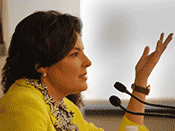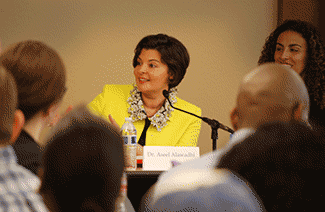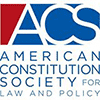 Visiting international researcher Dr. Aseel Alawadhi presented "The Stumbling Democracy in the Middle East: Challenges and Prospects" at Texas A&M University School of Law on April 10, 2014, an event sponsored by the Texas A&M Law American Constitution Society (ACS) student organization. Texas A&M School of Law associate professor Sahar Aziz served as co-panelist and Paul George, Texas A&M School of Law professor, moderated the discussion.
Visiting international researcher Dr. Aseel Alawadhi presented "The Stumbling Democracy in the Middle East: Challenges and Prospects" at Texas A&M University School of Law on April 10, 2014, an event sponsored by the Texas A&M Law American Constitution Society (ACS) student organization. Texas A&M School of Law associate professor Sahar Aziz served as co-panelist and Paul George, Texas A&M School of Law professor, moderated the discussion.
Alawadhi, one of the first female parliament members elected to the National Assembly of Kuwait, is an assistant professor of ethics and critical thinking at Kuwait University and received her Ph.D. in philosophy from the University of Texas at Austin, where she wrote her dissertation on Islamic liberalism.
In her talk, Alawadhi said a democratic system similar to one in the United States cannot work effectively in the Middle East because of the authoritarian culture. “You can’t implement democracy when no prerequisites exist and expect it to flourish like in Western societies,” Alawadhi said. “You can’t generalize. Countries are different from each other,” she said. She suggested the Middle East should treat democratization like a recipe – one that can be adjusted to get the desired outcome.
 During the question and answer period, topics surfaced including lack of equality for women in authoritarian societies, U.S. President Obama’s election, re-election and tenure in office, as well as U.S. military involvement in the Middle East. Alawadhi said that if a woman was elected President of the United States, it might encourage women in the Middle East to become more active in their own government and that they could feel empowered. “Even if it’s not happening right now, it will happen. It is a different era, and we have to break the norms,” she said.
During the question and answer period, topics surfaced including lack of equality for women in authoritarian societies, U.S. President Obama’s election, re-election and tenure in office, as well as U.S. military involvement in the Middle East. Alawadhi said that if a woman was elected President of the United States, it might encourage women in the Middle East to become more active in their own government and that they could feel empowered. “Even if it’s not happening right now, it will happen. It is a different era, and we have to break the norms,” she said.
Co-panelist professor Sahar Aziz added perspective on Egyptian law and democracy, identifying the differences and similarities between our cultures. “The United States is a young country and very diverse. We need to understand what has been sacrificed to get to where we are,” Aziz said, citing U.S. events like the Civil War and civil rights movement.
In closing remarks, Alawadhi said, “Don’t replace one authoritarian with another. Let them (Kuwaitis) struggle through until they find what works for them. A democratic system is not one size fits all.”
 The event, organized by membership chair 1L Alyssa Ortiz and events coordinator 1L Yasmine Salem Hamdan, was the second of the week hosted by the students of ACS. The Texas A&M Law chapter was named Student Chapter of the Week by the American Constitution Society, in part for their outstanding success in organizing engaging panels with notable speakers and their dedication to addressing topical events. Prof. Aziz, faculty advisor for ACS, lauded, "Not only does their service contribute to educating our students and community at large, but it exhibits our law school's commitment to public service and social justice."
The event, organized by membership chair 1L Alyssa Ortiz and events coordinator 1L Yasmine Salem Hamdan, was the second of the week hosted by the students of ACS. The Texas A&M Law chapter was named Student Chapter of the Week by the American Constitution Society, in part for their outstanding success in organizing engaging panels with notable speakers and their dedication to addressing topical events. Prof. Aziz, faculty advisor for ACS, lauded, "Not only does their service contribute to educating our students and community at large, but it exhibits our law school's commitment to public service and social justice."
For more information about upcoming TAMU Law ACS events, visit the group’s Facebook page or contact faculty advisor Aziz at saziz@law.tamu.edu.
- Article contributed by Daniella Wiedel, photos by Christy Cleger